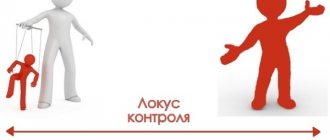Psychology as a certain form of everyday knowledge arose a very long time ago, almost with the advent of human society. The accumulation of everyday experience later served as the basis for psychology oriented toward scientific thinking. Everyday and scientific psychology are distinguished by their versatile approach, cultural level and degree of organization.
Everyday knowledge and all accumulated experience are the results of spontaneous observations, while scientific knowledge is built on the conclusions of professionals made during organized experiments.
Articles on the topic
- Why do we often feel lonely in a crowd 01/22/2021
- Why is adaptation disorder dangerous in the army and can it be overcome 12/24/2020
- The main qualities of a manipulator: how to determine who is next to you 11/23/2020
- Theories of personality in psychology as the basis for the further development of science 09/19/2020
Everyday psychology: what is it
This is knowledge that is accumulated and used in life. Everyday psychology includes someone’s reasoning, observations, and conclusions regarding a specific situation. For example, children are great at manipulating their parents, but they don't know how to do it with all people.
Everyday psychological knowledge is distinguished by the following:
- always specific;
- intuitive;
- tied to certain conditions, situations, participants.
This type is usually called wisdom.
Features of everyday psychology, what characterizes it:
- conclusions are often irrational;
- most often there is an erroneous generalization;
- judgments are based on fears and personal experiences;
- judgments are subject to moods, fashion, rumors;
- everyday knowledge is based on random situations and reflections;
- the cultural level of everyday psychology is low, it is mundane, often mixed with superstitions.
Another specific characteristic of everyday psychology is that people present their “discoveries” with confidence. They call themselves psychologists, teachers, mentors. Bloggers and Instagrammers are the most striking example of everyday psychology. They are confident that they are right, they will grab the top ranks in the discipline or come to some conclusions based on personal experience, and then pass it off as the ultimate truth. They give ready-made schemes and advice that do not help everyone. So the next time you come across something like this, I recommend being very careful and not believing everything that a “natural psychologist” or an amateur psychologist says. Brightness, novelty, closeness to the majority opinion does not mean that the information is correct.
Memory
Memory is a mental function and a type of mental activity designed to preserve, accumulate and reproduce information. The ability to store data about events in the surrounding world and the body’s reactions for a long period of time, and use it.
The following memory processes are distinguished:
- Memorization;
- Storage;
- Play;
- Forgetting.
Memory is also divided into typologies:
- By sensory modality - visual, kinesthetic, sound, gustatory, pain;
- In terms of content – emotional, figurative, motor;
- According to the organization of memorization - procedural, semantic, episodic;
- According to time characteristics – ultra-short-term, short-term, long-term;
- According to physiological characteristics - long-term and short-term;
- According to the availability of funds - non-mediated and indirect;
- According to the presence of a goal - involuntary and voluntary;
- According to the level of development - verbal-logical, figurative, emotional and motor.
You will find ways and techniques for developing memory in a separate training on our website.
Scientific psychology: what is it
This is data that is accumulated through research and is used both in theory and in practice, that is, in life. The discipline arose in the 19th century, but life's wisdom accumulated along with the development of society.
Specifics of scientific (academic) psychology, its difference from everyday psychology:
- The first is science. The second is someone’s views, the results of reflection, analysis, introspection, and social interaction.
- Scientific information is closely related to statistics, mathematical calculations, experiments, experiments.
- Scientific data is always rationally summarized and explained. They are carefully verified, confirmed, and do not depend on the emotions or moods of an individual subject or society. They are objective and impartial. As a rule, they are distinguished by a higher cultural and intellectual level.
- Facts from science are relevant for the entire society; they take into account the specifics of certain conditions and the differences of individuals.
Next, let's look at the characteristics of everyday and scientific psychology in comparison.
Speech
Speech is a form of communication between people through linguistic structures. In this process, thoughts are formed and formulated using language, and the received speech information is perceived and understood. Speech is a form of existence of human language, because. speech is language in action.
Language (speech) performs the following functions:
- A tool for intellectual activity;
- Method of communication;
- A way of existence, as well as the assimilation and transfer of experience.
Speech is the most important part of human activity, which contributes to knowledge of the world around us and the transfer of knowledge and experience to others. Being a means of expressing thoughts, it is one of the main mechanisms of human thinking. It depends on the form of communication and is thus divided into oral (speaking/listening) and written (writing/reading).
Speech has the following properties:
- Content – the number and significance of expressed aspirations, feelings and thoughts;
- Clarity – correctness;
- Expressiveness – emotional coloring and richness of language;
- Effectiveness is the influence exerted on other people, their feelings, thoughts, emotions, etc.
You can read more about speaking and writing in our trainings on public speaking and writing.
Comparison of everyday and scientific psychology
“Take my advice,” says your friend. “I want to share my experience to help others overcome this difficult situation,” says the blogger. In both cases we are dealing with amateurs, not professionals. The key difference between everyday and scientific psychology is that the first is private, concrete. What helped one person may be completely useless to another, and may even harm a third. This is not the only difference in directions. Let's look at them in more detail, and also talk about the connection between the directions.
Differences between everyday and scientific psychology
The two types differ in the nature of knowledge, content and methods of transferring experience. Let's look at the basics:
- The amateur type is the experience of one person, with all its nuances. Psychological knowledge is chaotic and based on intuition. The individual receives them by chance. The experience of science is always systematized, obtained through special experiments, extensive in application, and reflects general laws and patterns.
- Amateur knowledge lives only in the sphere where a person received it, only in the life of this person. An individual can convey his knowledge orally or in writing to other people, but still it will only be his experience, his guesses, his considerations. Traditions, rituals, sayings, aphorisms, folk wisdom, proverbs - all these are examples of storing amateur psychology. Often several sources of information contradict each other. For example, for every proverb you can find an “anti-proverb”: “Teaching is light, not teaching is darkness”, “Live forever, learn – you will die a fool.” Information from science is passed down from generation to generation, it is taught in universities, it is stored in books. Scientific knowledge is constantly deepening and expanding.
- Amateur conclusions are tied to the situation, specific conditions and time. Using them is very problematic, not every person is suitable for this or that wisdom, and the advice of strangers does not always work. Science is not tied to time and conditions; it is methods, techniques that always work. And if special conditions are needed, then this is always said.
Thus, while one type describes certain phenomena in a versatile and chaotic manner, the other explains them through terms, concepts, definitions, patterns, and cause-and-effect relationships.
The relationship between everyday and scientific psychology (briefly)
You probably already guessed that both types are closely interrelated. Examples of connections and relationships:
- professional research is based on life experience (someone noticed something and decided to substantiate it, identify general patterns, find solutions);
- psychological science takes its tasks from everyday experience;
- The final test of scientific knowledge is the test of life experience.
Does science influence life? Undoubtedly. This is what we usually call practical psychology. We are talking about all the techniques, methods, trainings that we use in life to improve it. All scientific psychological research arises against the background of current problems of society. People suggest what they need - psychologists try to help. According to this, three types can be roughly distinguished: everyday, scientific and practical psychology. The latter combines the other two types.
Most psychologists who have received appropriate training relate to both types. Someone chooses only the theoretical part, but even in this case he is faced with everyday problems of people, because without this it is impossible to put forward and test a hypothesis. For this, everyday observation is used. In psychology, this is one of the methods that involves testing a hypothesis or research results in real conditions (not laboratory ones).
Thus, the specificity of scientific and everyday psychology is as follows: there is a need for everyday psychological knowledge for the development of psychology as a science.
Classification of personality psychotypes
Well-known psychological types were identified and described by the Austrian psychiatrist and psychoanalyst C. G. Jung.
His theory about “introversion - extraversion”, as well as about the four types of perception of the world, has developed and continues to develop.
Psychological personality types proposed by Jung:
Personality types depending on the vector of its orientation:
- An extrovert is a person psychologically oriented to the outside world; sociable, active, active.
- An introvert is a person focused on the inner world; closed, sensitive, reasonable.
Psychological types depending on the predominant way of perceiving life, in other words, on the main mental function:
- Thinking type - a person who primarily relies on logic and thinking when making decisions. The sphere of feelings is suppressed.
- Feeling type - a person focused on feelings, judges in terms of “good - bad”, and not logically.
- The sensing type is a person who perceives life directly through the senses; he looks, listens, touches and makes decisions based on the information he receives. Intuition is suppressed by him.
- Intuitive type - a person who relies on the “sixth” sense; such people make decisions based on intuitive, unconscious knowledge, rather than on direct sensations.
Based on Jung’s typology, in the seventies and eighties of the last century, Soviet sociologist A. Augustinavichiute developed one of the most detailed and reliable personal typologies and became the founder of a scientific direction called “socionics”.
A. E. LICHKO
Another Soviet scientist A.E. Lichko, observing teenagers, identified psychological types that describe the types of character accentuations. Accentuation is an excessive strengthening of individual character traits, psychological deviations bordering on psychopathology, but not beyond the norm.
- In adolescence, the crisis age, accentuation manifests itself most pronouncedly.
- Later, the character “smoothes out”, and accentuation appears only in crisis, stressful situations.
K. LEONHARD
The German scientist K. Leonhard proposed a similar classification, but did not limit it to the puberty period. The classification is based on an assessment of a person’s communication style with his immediate environment.
Psychological types according to K. Leonhard:
- Hyperthymic. Optimistic, sociable, proactive, active, conflict-ridden, irritable, frivolous.
- Disthymic. Pessimistic, silent, withdrawn, non-conflict, conscientious, fair.
- Cycloid. Changeable type, combining hyperthymia and dysthymia.
- Excitable. Slow, irritable, gloomy, domineering, conscientious, neat, loving animals and children.
- Stuck. Perfectionist, inquisitive, fair, ambitious, touchy, suspicious, jealous.
- Pedantic. Formalist and neat, serious, reliable, non-conflict, passive, boring.
- Anxious. Timid, insecure, defenseless, pessimistic, self-critical, friendly, efficient, sensitive.
- Emotive. Excessively vulnerable, tearful, passive, kind, compassionate, responsive, efficient.
- Demonstrative. Can be both a leader and an opportunist; self-confident, artistic, courteous, captivating, extraordinary, selfish, boastful, lazy.
- Exalted. Extremely sociable, experiencing bright and sincere feelings, amorous, altruistic, compassionate, changeable, prone to panic and exaggerate.
- Extroverted. Sociable and talkative, open, efficient, frivolous, prone to excitement and risk.
- Introverted. Idealist, reserved, philosophizing, non-conflict, principled, restrained, persistent, stubborn.
Everyday and scientific psychology: briefly connections and differences
Once again we summarize all of the above in the form of a table. So, here’s how everyday psychology differs from scientific psychology:
| Criterion | Amateur | Academic |
| Abstractness/precision of knowledge | Always specific, associated with certain situations and people. | Expressed in laws, concepts and definitions, there is a noticeable desire for generalization. |
| Nature of knowledge | Based on intuition, trial and error. | Rational and conscious knowledge is always scientifically justified, experimentally confirmed. |
| Systematization, accumulation, transmission of information | Knowledge dies with man; it lives in folk art. | Passed on from generation to generation through books, recordings, videos, universities, etc. |
| How information is received | Through personal observations and reflections. | During observations, reflections, experiments. |
| Volume of information, accuracy of concepts | Knowledge is limited, concepts are vague and ambiguous. | The material is voluminous, the concepts are precisely defined. |
The types have something in common, but at the same time they have many differences. The amateur type is the experience of a person or an entire society. The scientific type is a discipline, science as it is.
Two relevant problems compare everyday and scientific psychology. Firstly, there is often a substitution of concepts; people try to pass off their observations as scientific laws and teach others about life (bloggers, Instagrammers, graphomaniacs, etc.). Secondly, professional psychologists lose a huge part of the topics to study. Scientific consideration limits the possibilities of studying objects and phenomena; concepts create rigid boundaries beyond which one cannot go.
Imagination
Imagination is the ability of a person’s consciousness to create and manage ideas, ideas and images. It plays a major role in mental processes such as planning, modeling, play, memory and creativity. This is the basis of a person’s visual-figurative thinking, which allows him to solve certain problems and understand the situation without practical intervention. A type of imagination is fantasy.
There is also a classification of imagination:
- By degree of direction - active and passive imagination;
- According to the results - reproductive and creative imagination;
- By type of images – abstract and concrete;
- According to the degree of volitional effort - unintentional and intentional;
- Techniques: typification, schematization, hyperbolization, agglutination.
Mechanisms of imagination:
- Typing;
- Accenting;
- Schematization;
- Agglutination;
- Hyperbolization.
Imagination is directly related to creativity. Sensitivity to emerging problems, ease of combining things, and observation skills contribute to finding creative solutions. The characteristics of imagination can be considered accuracy, originality, flexibility and fluency of thinking.
Read more about imagination in psychology in the article “Mental processes: types and brief description.” In addition, the lesson “Development of Creative Imagination” from our course on creative thinking is devoted to the problems of developing imagination.
Knowledge about life
So, it is important to understand that everyday psychology is far from science, it is a kind of synthesis of people’s knowledge about life, about themselves, the quintessence of experience, observations and experiences. Of course, conclusions drawn on the basis of subjective experience can hardly be objective and acceptable to others
Everyday psychology, its main features and characteristic features:
1. Specificity and down-to-earthness. Everyday psychology tends to talk about specific people and the situations in which they find themselves; it relies on the subjective experiences of specific people. Usually, as an example, they give you stories that happened to some person who found himself in a certain situation and made certain conclusions for himself (naturally, this conclusion will be relevant and useful for him, but it is not a fact that this knowledge can be widely applicable and used other people).
2. Intuitive nature of knowledge. The peculiarities of everyday psychology are that it relies on intuition, on subjective feelings, and usually no one seeks to check their feelings or try to think about them. This is most often the main limitation of intuitive knowledge - it is almost impossible to explain it to another person, “I just realized something.”
3. Insufficient depth of knowledge. People make conclusions superficially, without examining certain motives, emotions or behavior of other people. As a rule, a conclusion is made quickly, without checking its reliability (this is where fears, beliefs, proverbs, superstitions come from, when people try to follow certain rules just because someone said so; following fashion or relying on popular books or articles lives here , which do not carry any scientific knowledge).
4. The main method is observation. Most of us make conclusions about something based only on periodic, short-term observation, which is not at all consistent with its scientific counterpart. As a result, this leads to a superficial perception of reality, since everything is verified only through personal experience, and, as we know, such a method is extremely subjective and limited.
We recommend: Gerontopsychology is
5. Everyday psychology does not have a common terminology. The life experience of many people is connected with different times, eras, states, so everyone tends to describe this or that state “in his own words,” into which he puts his own meaning, which only he fully understands. This often leads to misunderstandings and substitution of concepts.
Such knowledge can be presented very confidently and openly, you can be convinced that a given method or point of view is correct, because it is written so in a magazine or because everyone does it. You can also be assured that this postulate has been tested by personal experience. For example, a person celebrated the New Year in a bad mood and the whole next year was not going well for him, after which he carries this knowledge to his friends as a dogma.
It is important to understand that not every person has inner instinct, insight, the ability to notice details and generate everyday psychological knowledge. Therefore, it is always worth remembering that not all other people’s knowledge can be useful for you, but sometimes you can listen and communicate with different people in order to have an idea about a certain phenomenon or learn about someone else’s experience, knowledge of which may be useful
The view of science
To begin with, it is important to understand the definition of psychology as such. So, psychology is a complex science, it explores one of the most mysterious and complex mechanisms in nature - the human psyche
In this regard, this scientific discipline requires attention, depth of research, as well as special working methods.
Throughout the 20th century, this science gained momentum, developed, and found more and more new methods for studying humans. The professional view of many theorists has helped this science become one of the most influential in our time. The theoretical aspect within its framework is extremely important, because the theory gives general ideas about the world and man, which exist in almost every science.
We recommend: What is hermeneutics?
In the process of long-term experiments, collection and analysis of theoretical and practical data, scientific or academic psychology was formed, the main features of which are as follows:
1. Generalizations. This sign suggests that conclusions are drawn not on the basis of what one specific person experienced, but on the basis of many experiments and observations. And when a certain fact, a certain behavioral reaction manifests itself in similar circumstances in a larger number of samples, a certain conclusion can be drawn based on detailed analysis and generalization.
2. Rationalization. Scientific psychology gains knowledge through experimentation and detailed reflection on its results. Data must be rationally explained, and a cause-and-effect relationship between phenomena must be traced.
3. No restrictions - this means that the data obtained through scientific experiments is applicable to a large number of people
For example, data on the fatigue of schoolchildren, how attention functions and what is the maximum number of objects we can hold in short-term memory - all this is consistent for most of the general population
We recommend: Hypnosis and hypnotic sleep
4. Reliance on various methods. As you know, scientific psychology has a fairly large range of different methods - from content analysis to psychological experiment. When using various methods for studying the psyche and its mechanisms, data is checked in order to identify variables that influence the experiment and create the necessary conditions for research.
- Observation is long-term monitoring of the manifestation of certain signs in those observed in natural and sometimes specially created conditions.
- A survey is a collection of information from a large number of people using questions, the answers to which are processed and grouped.
- Tests are a method of quantitative and qualitative assessment of a person’s mental processes, his behavioral and emotional reactions. With the help of tests, you can assess both a person’s mental and intellectual abilities, as well as the level of his anxiety or creative abilities.
- Experiment - this method is aimed at studying specific mental phenomena in certain, specially created and controlled conditions. Almost any experiment serves to confirm or refute a theory or hypothesis.
5. Systematization of knowledge is a theoretical approach. Everything that science receives in the course of research and experiments is systematized, analyzed, on the basis of which certain conclusions are drawn. And it must be said that in order to systematize any knowledge or come to a certain conclusion, it takes a lot of time, sometimes several years.
6. The main features of the scientific approach are the presence of a single glossary and the use of a single terminology. Psychology as a science has a clear system of terms that describe certain states and processes. And this, in turn, eliminates discrepancies when one concept is replaced by another.
7. Use of mathematical statistics methods for data processing. They avoid unreliability, subjectivity, and eye-catching conclusions.
We recommend: Graphology: the science of handwriting
The relationship between everyday and scientific psychology is obvious - one explores practice and accumulates experience, the other tests everything through experiment. But we should never forget that everyday psychological knowledge is not scientific, which means that it cannot always be applied by one person or another and be effective.
If we recall all the stages of the development of psychology as a science, we can say that this knowledge largely began with the use of the method of introspection, when the scientist observed himself and his subjective experiences. Based on this, many conclusions and conclusions were made.
Stage of elementary sensory psyche
In Russian psychology, the opinion has long been established that animal behavior is essentially instinctive behavior. Instincts are also associated with those forms of behavior that are acquired by specific animals during the course of their lives.
^ Instinctive behavior is a species-specific behavior that is equally directed in all representatives of the same animal species. As a rule, instinctive behavior is determined by biological expediency and consists in ensuring the possibility of existence (survival) of a specific representative or species as a whole. But it would not be entirely correct to say that the behavior of an animal is only genetically determined and does not change throughout life.
The conditions in which an animal finds itself are constantly changing, so individual adaptation exists in all animals.
A feature of animal behavior in the early stages of development is that it is always stimulated and controlled by individual properties of objects affecting the animal. For example, as soon as an insect falls into a web, the spider runs towards it and entangles it with its thread. What causes this spider behavior? The vibration of the web transmits the vibration of insect wings. As soon as the vibration stops, the spider stops moving towards its victim, but as soon as the vibration is resumed, the spider begins to move again. The fact that it is the vibration of the web that determines the behavior of the spider is proven by the following experiment: a vibrating tuning fork brought to the web causes the spider to move, while at the same time the vibration of the wings of a fly, grabbed with tweezers and brought directly to the spider, causes the spider to flee.
Several questions involuntarily arise. Firstly, what explains the incentive effect of certain properties of objects and, secondly, why is any animal behavior possible at all? The answer to the first question is simple: the vibration of the web is consistently associated with the absorption and assimilation of food by the spider - an insect caught in the web. Consequently, such behavior of animals has a biological meaning, since it is associated with the satisfaction of biological needs, in this case with the absorption of food.
It should be noted that the biological meaning of the influence of objects that excite and direct the behavior of an animal is not constant, but changes and develops depending on the specific living conditions of the animal and the characteristics of the environment. If, for example, you start feeding a hungry toad worms, and then put a match and a lump of moss in front of it, it will grab the match, which, like worms, has an elongated shape. But if you first feed the toad spiders, it will not pay attention to the match and will grab the moss. Round shapes now took on the meaning of food for her.
This stage of development, characterized by the fact that the behavior of an animal is stimulated by individual properties of an object due to the fact that they are associated with the implementation of the basic vital functions of animals, is called the stage of elementary behavior. Accordingly, this level of psyche development is called the stage of elementary sensory psyche.
Methods for obtaining information
There are judgments that sound convincing, but are questioned by skeptics. Those around you are attracted by brightness, persuasiveness, and novelty of expressions. They do not pay attention to the disconfirming evidence provided by experienced researchers.
There is more substantiated information among scientific concepts than among everyday knowledge. Common speculations:
- A curse placed on a family is removed by begging forgiveness from the dead.
- After the loss of a loved one, a relative will certainly suffer severe psychological trauma.
- Childhood psychotraumas can interfere with normal activities and development.
- Without maternal love, a full-fledged personality will not be formed.
Motivation
Motivation is the urge to perform an action. This process controls human behavior and determines its direction, stability, activity and organization. Thanks to motivation, a person can satisfy his needs.
There are several types of motivation:
- External – due to external conditions;
- Internal – due to internal circumstances (content of activity);
- Positive – based on positive incentives;
- Negative – based on negative incentives;
- Sustainable – determined by human needs;
- Unstable - requires additional incentive.
Motivation can be of the following types:
- From something (basic type);
- To something (basic type);
- Individual;
- Group;
- Cognitive.
There are certain motives that in most cases guide people:
- Self-affirmation;
- Identification with other people;
- Power;
- Self-development;
- Achieving something;
- Social significance;
- The desire to be in the company of certain people;
- Negative factors.
Motivation issues are discussed in more detail in the fourth lesson of this course, as well as in the article “How Motivation Works.”
Wisdom or subjective understanding of the world
The peculiarities of everyday psychology are that observations depend on personal experience, incidents occurring around the individual.
A person subjectively understands the features of the world, psychological patterns. Another name for everyday psychology is wisdom. There are three sources of development of this branch of psychology:
- Joint activities with other people.
- Communication with others.
- New acquaintances, relationships.
To show his life through wisdom, the subject can use different tools:
- music;
- books;
- paintings.
They help others feel the inner world of the author. The most striking examples of experienced psychologists are individuals whose work involves constant communication.
Structure of mental phenomena
Mental processes
Mental conditions
Mental properties
Cognitive Sensation, perception, representation, memory, imagination, thinking, speech, attention
Elation, depression, fear, vigor, etc.
Direction, temperament, abilities, character
Emotional excitement, joy, indignation, anger, etc.
Strong-willed
making decisions, overcoming difficulties,
struggle of motives, managing one’s behavior
Mental processes
act as primary regulators of human behavior. Ps processes have a definite beginning, course and end, i.e. have certain dynamic characteristics, which include parameters that determine the duration and stability of the mental process.
On the basis of mental processes, certain states are formed, knowledge, skills and abilities are formed.
In turn, mental processes are divided into three groups: cognitive, emotional and volitional.
Cognitive mental processes include mental processes associated with the perception and processing of information. These include sensation, perception, representation, memory, imagination, thinking, speech, attention. Thanks to these processes, a person receives information about the world around him and about himself
Have you noticed that some events remain in your memory for a long time, while others you forget about the next day, and other information may go unnoticed by you. This is due to the fact that any information may or may not have an emotional connotation, i.e.
may or may not be significant. Therefore, along with cognitive processes, emotional mental processes are distinguished as independent ones.
We have the right to believe that if a certain event or phenomenon evokes positive emotions in a person, then this has a beneficial effect on his activity and condition, and, conversely, negative emotions complicate activity and worsen the person’s condition. However, there are exceptions.
For example, an event that causes negative emotions increases a person’s activity and stimulates him to overcome the obstacles that have arisen.
Such a reaction indicates that for the formation of human behavior, not only emotional, but also volitional mental processes are important, which clearly manifest themselves in situations related to decision-making and overcoming difficulties.
Sometimes they are identified as an independent group - unconscious processes. It includes those processes that occur or are carried out outside the control of consciousness.
Mental processes are closely interconnected and act as primary factors in the formation of mental states.
Mental conditions
characterize the state of the psyche as a whole. They have their own dynamics, which are characterized by duration, direction, stability, and intensity.
At the same time, mental states influence the course and outcome of mental processes and can promote or inhibit activity.
Mental states include such phenomena as elation, depression, fear, and vigor.
The next class of mental phenomena - mental properties of personality -
characterized by greater stability and greater constancy.
Under the mental properties of personality
It is customary to understand the most significant personality characteristics that provide a certain quantitative and qualitative level of human activity and behavior. Mental properties include orientation, temperament, abilities, character. The level of development of these properties, as well as the peculiarities of the development of mental processes and the prevailing (most characteristic of a person) mental states determine the uniqueness of a person, his individuality.
The phenomena studied by psychology are associated not only with a specific person, but also with groups.
Mental phenomena associated with the life of groups and collectives are studied in detail within the framework of social psychology.
Thus, the subject of psychology is the psyche and mental phenomena of both one specific person and mental phenomena observed in groups and collectives.











